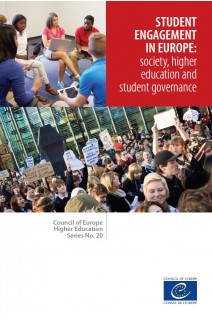



Democratic institutions and laws are essential, but they cannot bring about democracy on their own. They will only function if they build on a culture of democracy, and our societies will not be able to develop and sustain such a culture unless education plays an essential role. Student engagement is crucial: democracy cannot be taught unless it is practised within institutions, among students and in relations between higher education and society in general.
This 20th volume of the Council of Europe Higher Education Series demonstrates the importance of student engagement for the development and maintenance of the democratic culture that enables democratic institutions and laws to function in practice. This volume covers three aspects of student engagement that are seldom explored: its role in society through political participation and civic involvement; its place in higher education policy processes and policy-making structures; and how student unions represent the most institutionalised form of student engagement. The authors are accomplished scholars, policy makers, students and student leaders.
Contents
PREFACE
A WORD FROM THE EDITORS
Manja Klemenčič, Sjur Bergan and Rok Primožič
INTRODUCTION – WHAT IS STUDENT AGENCY? AN ONTOLOGICAL EXPLORATION IN THE CONTEXT OF RESEARCH ON STUDENT ENGAGEMENT
Manja Klemenčič
PART I – STUDENTS’ ROLE IN SOCIETY
Chapter 1 – Theorising student activism in and beyond the 20th century: the contribution of Philip G. Altbach
Thierry M. Luescher‑Mamashela
Chapter 2 – “I am tired of reading history. Now I want to make it!” The rise and fall of the university campus as a space for social rebellion
Rómulo Pinheiro and Dominik Antonowicz
Chapter 3 – Student activism in times of individualisation: the case of Slovenia
Mirjana Ule
Chapter 4 – “A truly transformative experience”: the biographical legacy of student protest participation
Bojana Ćulum and Karin Doolan
Chapter 5 – Parliaments or streets?
Milica Popović
Chapter 6 – Student union resistance to tuition fees in Finland
Leasa Weimer
Chapter 7 – The role and capacity of youth organisations and student engagement: a comparative study of Serbia, Croatia and “the former Yugoslav Republic of Macedonia”
Martin Galevski
Chapter 8 – A challenge for student engagement: the decline of the “normal” student
Dominic Orr, Froukje Wartenbergh‑Cras and Christine Scholz
Chapter 9 – Student engagement: the social dimension and role of quality assurance
David Crosier
PART II – STUDENT INFLUENCE IN HIGHER EDUCATION
Chapter 10 – Changing the shape and outcomes of student engagement
Paul Trowler
Chapter 11 – Towards student engagement as an organisational task? Some recent examples from Germany
Marion Gut
Chapter 12 – Student engagement: providing services or forging partnerships?
Vicki Trowler
Chapter 13 – Politics as process: Salford’s charter of student rights
Martin Hall and Andrew Snowden
Chapter 14 – Innovative forms of student engagement: how virtual co‑operative communities counterbalance the exclusion of students from active learning and governance
Petr Pabian
Chapter 15 – The evolution of public discourse on higher education financing in Europe: students’ unions and European processes
George‑Konstantinos Charonis and Robert Santa
Chapter 16 – ESU Student Experts’ Pool on Quality Assurance: a mechanism for involving students in quality assurance in Europe
Asnate Kažoka
PART III – STUDENT GOVERNANCE
Chapter 17 – We are one, but we’re not the same: explaining the emergence of hybrid national student unions
Jens Jungblut and Regina Weber
Chapter 18 – Student engagement in higher education policy making: a view from the Polish representative in the Bologna Follow‑Up Group
Bartłomiej Banaszak
Chapter 19 – Students’ rights: shaping the student movement at national and European level
Gabriela Bergan
Chapter 20 – The policy influence strategy of student representatives: a comparative, case‑based survey in Flemish University Colleges (Belgium)
Michiel Horsten
Chapter 21 – Belonging, social capital and representation: first‑generation students’ voices in Portuguese higher education
Ana Sofia Ribeiro
Chapter 22 – The quality of representation of international students in higher education governance: a case study of the German Federal State of Schleswig‑Holstein and its higher education institutions
Laura Asarite and Sophie Wulk
Chapter 23 – Student unions and British popular music culture
Paul Long
CONCLUSION – DEMOCRATIC CULTURE, EDUCATION AND STUDENT ENGAGEMENT
Sjur Bergan
INDEX
NOTES ON THE CONTRIBUTORS
PUBLICATIONS IN THE COUNCIL OF EUROPE HIGHER EDUCATION SERIES
Download an extract (1000)







Democratic institutions and laws are essential, but they cannot bring about democracy on their own. They will only function if they build on a culture of democracy, and our societies will not be able to develop and sustain such a culture unless education plays an essential role. Student engagement is crucial: democracy cannot be taught unless it is practised within institutions, among students and in relations between higher education and society in general.
This 20th volume of the Council of Europe Higher Education Series demonstrates the importance of student engagement for the development and maintenance of the democratic culture that enables democratic institutions and laws to function in practice. This volume covers three aspects of student engagement that are seldom explored: its role in society through political participation and civic involvement; its place in higher education policy processes and policy-making structures; and how student unions represent the most institutionalised form of student engagement. The authors are accomplished scholars, policy makers, students and student leaders.
Please note that in accordance with our terms & conditions, PDF/epubs may only be purchased by private individuals.
